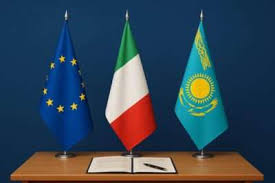Kazakhstan, Italy, and the Battle for Europe’s Energy Future

entral Asia is no longer on the periphery of global events, but a place where major countries come together with their ideas, money, and projects. In a turbulent and highly uncertain geopolitical environment, global powers are seeking to establish their presence in this strategic, energy-rich region. Italy is no exception.
Italian Prime Minister Giorgia Meloni was initially scheduled to visit Kazakhstan in late April, but in light of Pope Francis’ passing her trip to Astana was canceled. Coincidently or not, she came to the Kazakh capital on May 30 to attend the Astana International Forum (AIF) – a two-day event that saw the attendance of political, business, and thought leaders who gathered under an expanded agenda that included climate change, energy security, and sustainability.
Meloni’s visit to Kazakhstan is part of her Central Asian tour; she previously visited Uzbekistan, where she met with the country’s President Shavkat Mirziyoyev. In Astana, she not only spoke at the AIF, emphasizing that the “Astana International Forum has become increasingly important in dialogue worldwide,” but also took part in the first-ever Central Asia–Italy summit.
“Italy was the first Nation in the EU to decide to invest in relations with Central Asia and its individual member Nations, launching a permanent format in order to share ideas,” Meloni said at the AIF, emphasizing that the EU–Central Asia Summit, held in April in Samarkand, “elevated the relations between the region and the European Union to a strategic partnership.”
In this relationship, Kazakhstan seems to play a crucial role. Italy is the largest Central Asian economy’s number one trading partner in Europe. According to Kazakhstan’s Ministry of Trade and Integration, trade turnover between Kazakhstan and Italy in 2024 amounted to $19.9 billion, which is 24% higher compared to the previous year ($16.1 billion). Oil is undoubtedly Kazakhstan’s main export to Italy, although critics argue that the third-most populous EU member is merely a transit country, as large amounts of Kazakh oil ultimately reach other European countries.
“If we really want to shape the future, we must have the courage to look beyond our geographical boundaries and pave new paths. I am thinking of the energy sector, where our cooperation can help make a difference, and I am also referring to critical raw materials, where our collaboration aims to generate shared benefits and mutual opportunities,” Meloni stressed.
Kazakhstan is one of the richest countries in the world in terms of natural resources. This makes it a nation of significant interest to Italy – with whom Astana signed a Strategic Partnership Agreement back in 2009 – as well as to other European states. But from the Kazakh perspective, it is important that this cooperation be mutually beneficial. Astana is seeking to avoid being seen merely as a source of raw materials and expects its partners to offer tangible benefits in return.
That is why Kazakhstan’s President Tokayev has pushed forcefully for the renegotiation of oil agreements with foreign energy companies operating in the country. For Astana, it is unacceptable that 98% of revenues go to foreign companies. That, however, does not mean that Tokayev does not value Kazakhstan’s relations with Italy.
“We are proud to be Italy’s main partner in Central Asia. Our economic cooperation is developing very dynamically and has enormous potential for further growth,” the Kazakhstani President said during his visit to Italy in January 2024.
A year later, Tokayev met Meloni again, this time at the Abu Dhabi Sustainability Week summit in the United Arab Emirates. These relatively frequent meetings perfectly illustrate growing Kazakh-Italian economic ties. Italy is now Kazakhstan’s third-largest trading partner, following China and Russia, and ranks among the top five foreign investors in the Kazakh economy. Their relationship is particularly strong in the energy sector, with over $18 billion in exports of Kazakh oil and petroleum products in 2024.
Moreover, in 2022, Eni – an Italian energy giant focused on petroleum, natural gas, and petrochemicals – launched the largest wind power plant, Badamsha I and II, with a capacity of 96 MW, in Kazakhstan’s Aktobe Region. Also, in July 2024, Eni and KazMunayGas – the national oil and gas company of Kazakhstan – started the construction of a 247 MW hybrid power plant in Zhanaozen, southwestern Kazakhstan. The plant will operate on solar, wind, and gas energy.
Beyond the economy, there are other areas where cooperation between Kazakhstan and Italy can be expanded, including culture and tourism. However, to attract more Kazakhstani tourists to Italy, the EU would need to abolish – or at least ease – visa procedures for citizens of Kazakhstan. That is something Astana is firmly pushing for and is hoping for Rome’s support.
In the meantime, Kazakhstan anticipates more Italian companies beginning operations in the country – there are currently around 300. It also looks forward to Italy’s increased involvement in the development of the Trans-Caspian International Transport Route (also known as the Middle Corridor), which connects Southeast Asia and Europe via Kazakhstan, the Caspian Sea, Azerbaijan, Georgia, and Turkey. Speaking at the AIF, Meloni said that the “Middle Corridor is probably the most promising and fascinating challenge” in connecting Europe with the region.
Finally, Kazakhstan, along with other Central Asian nations, expect that rising geopolitical tensions and risks to global transit routes will lead European countries to focus more on stability and security in this important region, and will therefore look to work more closely with their Central Asian partners.





